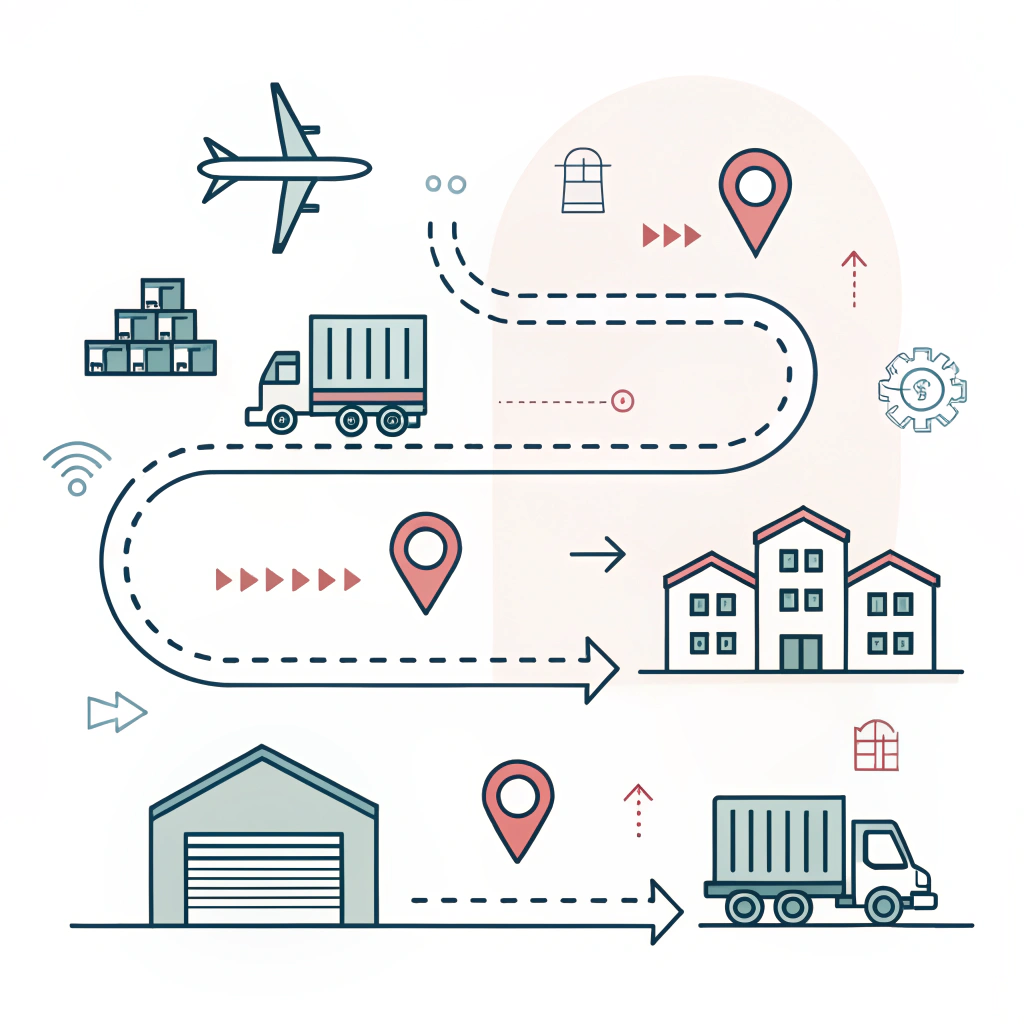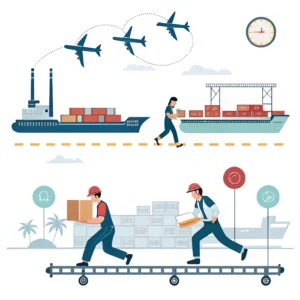Reliable logistics support is the backbone of every successful business because it ensures that every component of the supply chain—from production and storage to transportation and delivery—operates in harmony. This reliable support minimizes delays, reduces costs, and improves overall efficiency, giving companies a competitive edge in global markets.
In today’s highly competitive and interconnected world, the significance of reliable logistics cannot be overstated. For supply chain executives, logistics managers, and business owners alike, having robust logistics support is critical to maintaining operational efficiency, reducing costs, and enhancing customer satisfaction. Without dependable logistics, even the best products may never reach their full market potential.
Many businesses face significant challenges when their logistics systems are not robust enough to handle the complexities of global trading. Common problems include:
- Delayed shipments: Late deliveries can disrupt production schedules and lead to customer dissatisfaction.
- Inaccurate inventory management: Without real-time tracking, companies may oversupply or run out of critical products.
- Rising operational costs: Inefficiencies in transportation, warehousing, and freight consolidation inevitably lead to cost overruns.
- Regulatory compliance issues: Mismanaged customs brokerage1 and regulatory clearances can cause delays and even legal penalties.
These issues not only threaten the operational integrity of a business but also have a direct impact on its financial performance and market position.
The primary drivers behind unreliable logistics often include:
- Infrastructure Limitations: Aging or inadequate transportation networks, inefficient warehouses, and limited technology integration can make timely deliveries challenging.
- Poor Coordination: A lack of synchronization between different logistics components—freight forwarding, customs brokerage, warehousing—can lead to miscommunication and delays.
- Underinvestment in Technology: Advanced tracking systems, automated warehousing, and real-time data analytics are necessary to optimize logistics but are often underutilized.
- Complex Regulatory Environment: International trade involves a maze of policies and customs regulations that require precise handling.
Understanding these underlying factors is the first step in devising a strategy to bolster your logistics support system.
To address these challenges, companies must adopt a multifaceted approach that integrates modern technology, skilled personnel, and robust processes. Below is a detailed list of vital strategies to ensure reliable logistics:
| Strategy | Description |
|---|---|
| Invest in Advanced Technology | Leverage real-time tracking, automated inventory systems, and predictive analytics2 to enhance visibility. |
| Strengthen Partnerships | Collaborate with reputable freight forwarders, carriers, and warehousing providers to build a reliable network. |
| Enhance Communication Channels | Use integrated platforms that allow seamless communication between all members of the supply chain. |
| Regular Process Audits | Continuously review and optimize logistics procedures to identify bottlenecks and improvements. |
| Skilled Workforce Development | Invest in training programs that ensure staff can effectively handle complex logistics scenarios. |
| Regulatory Compliance Management | Implement robust customs brokerage and compliance solutions to navigate international trade regulations. |
This table outlines some of the most effective solutions available to companies aiming to upgrade their logistics operations.
Adopting best practices is crucial for any business looking to enhance its logistics support. Here are several actionable methods:
Modern logistics systems thrive on data. Real-time tracking and automated systems can drastically improve inventory management and shipment visibility. Technologies such as RFID3, GPS, and IoT sensors4 help monitor the entire supply chain, making it possible to address issues before they become critical problems.
Relying solely on in-house logistics capabilities can be risky, especially in dynamic global markets. Companies benefit from partnering with specialized logistics providers who offer expertise in freight forwarding, customs clearance, and warehousing. These partnerships lead to more efficient and streamlined operations.
Implementing a feedback loop within your logistics processes ensures that you can continuously optimize operations. Key Performance Indicators (KPIs)5 such as on-time delivery, cost per shipment, and inventory turnover rates provide useful insights into the system’s efficiency. Regular audits and quality checks are essential in maintaining high standards.
Supply chains are vulnerable to disruptions ranging from natural disasters to political instability. Proactive risk management, including alternative routing strategies and diversified supplier pools, helps companies remain resilient. Contingency plans ensure that even unexpected challenges do not cripple operations.
As companies worldwide shift towards more sustainable practices, the logistics sector is not left behind. Incorporating eco-friendly transportation methods, optimizing routes to reduce fuel consumption, and using sustainable materials in warehousing can not only lower costs but also meet regulatory and consumer expectations.
Reliable logistics is more than just a backend function—it is a core strategic initiative that drives business performance. Numerous studies have highlighted the correlation between efficient supply chain management and enhanced financial performance. For instance:
- Cost Efficiency: Companies that invest in modern logistics systems have reported cost savings of up to 15% in transportation and warehousing expenses.
- Customer Satisfaction: Businesses with reliable logistics support often see improved customer satisfaction scores, which can directly influence repeat business and referrals.
- Operational Efficiency: Enhanced tracking and inventory management lead to better production planning and lower incidences of stockouts.
Case Example: A leading multinational company enhanced its global operations by partnering with a specialized logistics provider. By integrating advanced tracking and management systems along with strategic freight consolidation, they reduced transit delays by 20% and improved overall cost efficiency by 12%. This case underscores the transformative power of reliable logistics support.
The importance of reliable logistics extends to numerous areas of business:
Efficient logistics directly contribute to lowering operational expenses. By reducing delays and minimizing wastage, companies can improve their bottom line. Cost savings from streamlined transportation and warehousing operations can be reinvested in other areas of the business, driving overall growth.
In highly competitive sectors, being able to consistently deliver products on time is a significant market differentiator. Businesses with reliable logistics have an edge when negotiating with partners and customers, fostering trust and long-term relationships.
The end customer invariably benefits from reliable logistics. Faster deliveries, accurate order fulfillment, and improved product quality translate to higher satisfaction rates. In a market where consumers have numerous choices, ensuring a smooth and dependable logistics experience is critical for customer retention.
Reliable logistics also build resilience into the supply chain. Businesses that are prepared for disruptions through robust logistical planning are better equipped to handle crises and maintain continuous operations. This resilience can be the deciding factor in whether a company survives or thrives during challenging times.
Investing in technology not only improves logistics but also drives innovation. The use of artificial intelligence, machine learning, and big data analytics in logistics forecasting and routing is transforming the industry. Companies that adopt these technologies are better positioned to anticipate market trends and respond more effectively to changes.
For B2B logistics decision-makers, the following steps can serve as a roadmap to enhance logistics reliability:
- Audit Your Current Logistics System: Identify and document any inefficiencies or bottlenecks throughout the supply chain.
- Invest in Technology: Prioritize the adoption of digital tools for real-time tracking, automated warehousing, and predictive analytics.
- Forge Strategic Partnerships: Build alliances with reputable freight forwarders and logistics providers who understand market dynamics and regulatory requirements.
- Train and Empower Your Team: Invest in continuous employee training to ensure your staff is skilled in the latest logistics technologies and practices.
- Implement Continuous Improvement Programs: Regularly review logistics performance through KPIs and adjust processes based on collected feedback.
By following these recommendations, supply chain leaders can transform their logistics operations into a robust pillar of support that drives business success.
Reliable logistics support is the lifeline of every successful business. It ensures that products are delivered on time, inventory levels are optimized, and operational costs are kept in check—ultimately leading to enhanced financial performance and competitive advantage. In an increasingly complex global market, investing in advanced technology, cultivating strategic partnerships, and continuously refining your logistics processes are not just options; they are necessities.
For businesses aiming to thrive in today’s dynamic environment, a strong, data-driven logistics foundation is vital. Every decision in supply chain management, from route optimization to risk management, contributes to the overarching goal of delivering excellence from start to finish.
What is the backbone of logistics?
Transportation is often considered the backbone of logistics because it involves the essential physical movement of goods. For companies, having reliable transportation systems such as road, rail, air, and sea networks is critical to ensuring that products reach their destinations efficiently and on time.
How does logistics contribute to the overall success of a business?
Logistics plays a critical role in a business’s success by managing and optimizing the complete supply chain—from production to delivery. This includes lowering operational costs, enhancing inventory control, ensuring organized storage, and ultimately improving customer satisfaction and competitive positioning.
Why is logistics important to a business?
Logistics is important because it serves as the blueprint for managing resources needed to move products throughout the supply chain. By coordinating transportation, warehousing, and customs brokerage, reliable logistics support helps companies operate smoothly, reduce delays, and achieve a more cost-effective and timely delivery process.
-
customs brokerage: Click to read an in-depth explanation of how customs brokerage facilitates the smooth passage of goods through international borders by managing essential documentation and compliance with trade regulations. Back to term ↩
-
predictive analytics: Click to uncover insights on leveraging predictive analytics in logistics, enabling companies to forecast demand, optimize routing, and mitigate operational risks. Back to term ↩
-
RFID: Click to learn about Radio Frequency Identification (RFID) technology and its role in enhancing asset tracking and inventory management across the supply chain. Back to term ↩
-
IoT sensors: Click to explore how Internet of Things (IoT) sensors are used in logistics to monitor shipments and improve real-time decision making in supply chain operations. Back to term ↩
-
Key Performance Indicators (KPIs): Click to understand the significance of KPIs in logistics, including how metrics such as on-time delivery and inventory turnover can drive continuous improvement. Back to term ↩












